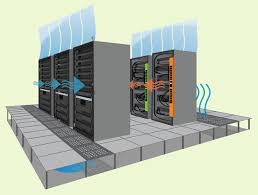Data Center Cooling Market: A Comprehensive Overview
In today's digital age, data centers serve as the backbone of the modern economy, powering everything from cloud computing to e-commerce. However, the increasing density of servers and the rising demand for computing power have led to significant challenges in maintaining optimal temperatures within these facilities. To address this issue, the data center cooling market has emerged as a critical component of data center infrastructure, providing innovative solutions to ensure efficient and sustainable cooling operations.
Market Overview
The data center cooling market has witnessed significant growth in recent years, driven by the growing demand for data storage and processing capabilities. With the proliferation of cloud computing, big data analytics, and the Internet of Things (IoT), the need for energy-efficient cooling solutions has become more pressing than ever before. The Data Center Cooling market is projected to grow from USD 15.58 Billion in 2023 to USD 28.3631 billion by 2030, exhibiting a compound annual growth rate (CAGR) of 10.50% during the forecast period (2023 - 2030). This growth is attributed to the increasing adoption of advanced cooling technologies, rising concerns about energy consumption and carbon emissions, and the growing trend of hyperscale data centers.
Request To Free Sample of This Strategic Report - https://www.marketresearchfuture.com/sample_request/1913
Key Market Segments
The data center cooling market can be segmented based on cooling technique, cooling solution, service, and region.
-
By Cooling Technique:
- Air-based Cooling: Utilizes air circulation and ventilation systems to remove heat from data center facilities.
- Liquid-based Cooling: Involves the use of liquid coolant, such as water or refrigerants, to absorb and dissipate heat from servers and equipment.
-
By Cooling Solution:
- Precision Air Conditioning (PAC): Provides targeted cooling to specific areas within the data center, ensuring optimal temperature and humidity levels.
- Chilled Water Systems: Circulates chilled water through pipes and coils to remove heat from servers and other equipment.
- Direct Expansion (DX) Cooling: Uses refrigerants to cool the air directly before circulating it through the data center.
-
By Service:
- Installation and Deployment Services: Includes the installation, configuration, and commissioning of cooling systems within data center facilities.
- Maintenance and Support Services: Offered to ensure the ongoing performance and reliability of cooling infrastructure through regular maintenance and troubleshooting.
Industry Latest News
-
Focus on Energy Efficiency: With environmental sustainability becoming a top priority for data center operators, there is a growing emphasis on energy-efficient cooling solutions. Advances in technologies such as liquid cooling, free cooling, and AI-driven optimization are enabling data centers to reduce their carbon footprint and operating costs.
-
Adoption of AI and Machine Learning: AI and machine learning algorithms are increasingly being integrated into data center cooling systems to optimize performance and energy consumption. These intelligent systems can analyze data in real-time, anticipate cooling requirements, and dynamically adjust cooling settings to maximize efficiency.
-
Modular Cooling Solutions: Modular cooling solutions, such as prefabricated modular data centers and containerized cooling units, are gaining traction due to their scalability, flexibility, and rapid deployment capabilities. These solutions allow data center operators to quickly expand cooling capacity to meet growing demand while minimizing upfront capital investment.
Data Center Cooling Companies
Several key players dominate the data center cooling market, offering a wide range of products and services to cater to diverse customer needs. Some of the prominent companies include:
- Schneider Electric SE: A global leader in energy management and automation solutions, Schneider Electric offers a comprehensive portfolio of data center cooling products, including precision air conditioning units, chillers, and cooling management software.
- Vertiv Group Corp.: Specializes in designing, building, and servicing critical infrastructure solutions for data centers, communication networks, and commercial and industrial facilities. Vertiv's data center cooling solutions include thermal management systems, refrigeration units, and integrated cooling modules.
- Daikin Industries, Ltd.: Known for its expertise in HVAC (heating, ventilation, and air conditioning) systems, Daikin offers a range of precision air conditioning units and chillers designed specifically for data center applications. Daikin's cooling solutions prioritize energy efficiency, reliability, and environmental sustainability.
- Airedale International Air Conditioning Ltd.: A leading manufacturer of precision air conditioning systems, chillers, and IT cooling solutions, Airedale provides innovative cooling solutions tailored to the unique requirements of data centers and critical facilities.
- Rittal GmbH & Co. KG: Specializes in providing enclosure systems, climate control solutions, and power distribution systems for data centers, industrial applications, and IT infrastructure. Rittal's data center cooling portfolio includes air/water heat exchangers, cooling units, and modular cooling systems.
Market Drivers
Several factors are driving the growth of the data center cooling market:
- Rising Demand for Data Storage and Processing: The exponential growth of data generated by digital applications, IoT devices, and cloud services is driving the need for scalable and efficient data center cooling solutions.
- Focus on Energy Efficiency and Sustainability: Data center operators are under increasing pressure to reduce energy consumption, lower operating costs, and minimize carbon emissions. Energy-efficient cooling technologies, such as free cooling, economization, and liquid cooling, are becoming essential for meeting sustainability goals.
- Increasing Complexity and Density of Data Centers: The proliferation of high-performance computing, AI, and machine learning workloads has led to higher server densities and heat loads in data centers. As a result, traditional cooling methods are no longer sufficient, driving the adoption of advanced cooling solutions.
- Shift Towards Hyperscale and Edge Data Centers: The rapid growth of hyperscale data centers and edge computing facilities is driving demand for scalable and adaptable cooling solutions that can support diverse deployment environments and architectures.
Ask for Customization - https://www.marketresearchfuture.com/ask_for_customize/1913
Regional Insights
The data center cooling market is geographically segmented into North America, Europe, Asia-Pacific, Latin America, and the Middle East & Africa.
-
North America: Dominates the data center cooling market, driven by the presence of leading technology companies, extensive data center infrastructure, and stringent regulations regarding energy efficiency and environmental sustainability. The United States accounts for the largest share of the market, with significant investments in data center cooling solutions.
-
Europe: Holds a substantial share of the market, supported by government initiatives to promote renewable energy sources and reduce carbon emissions. Countries like Germany, the United Kingdom, and the Netherlands are leading the adoption of energy-efficient cooling technologies in data centers.
-
Asia-Pacific: Expected to witness rapid growth in the coming years, fueled by the increasing demand for digital services, cloud computing, and IoT applications. Emerging economies such as China, India, and Singapore are investing in data center infrastructure and cooling solutions to support their digital transformation initiatives.
-
Latin America: Shows steady growth in the data center cooling market, driven by the expanding telecommunications sector, rising internet penetration, and growing adoption of cloud-based services. Countries like Brazil, Mexico, and Chile are experiencing increasing demand for data center cooling solutions.
-
Middle East & Africa: Gradually emerging as a key market for data center cooling, supported by government investments in digital infrastructure and the development of smart cities. Countries like the United Arab Emirates, Saudi Arabia, and South Africa are witnessing growing investments in data center projects and cooling technologies.



